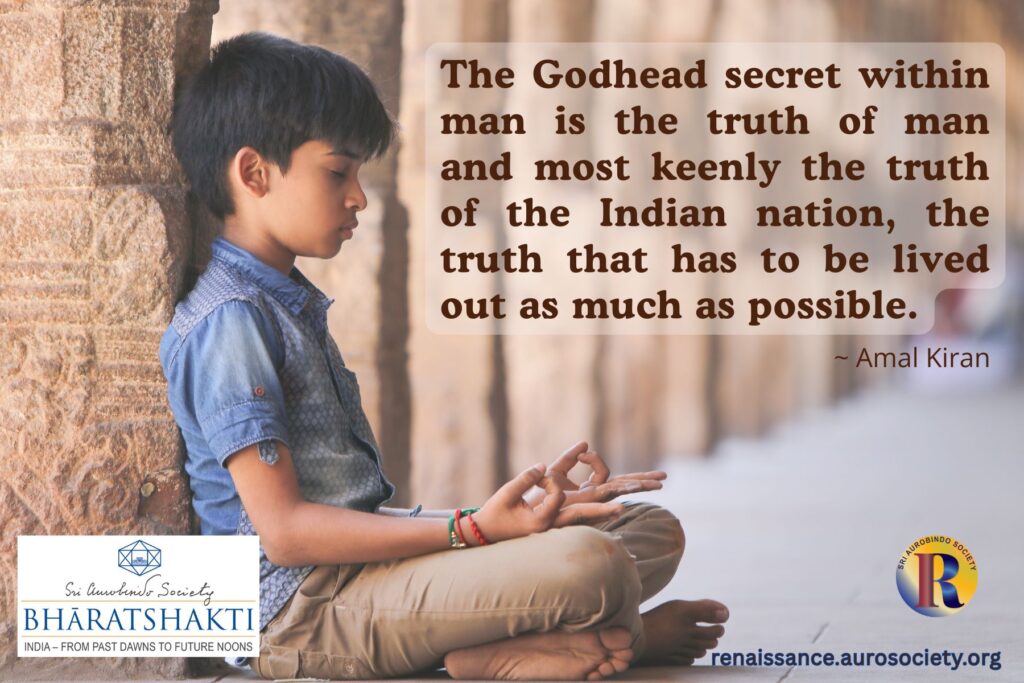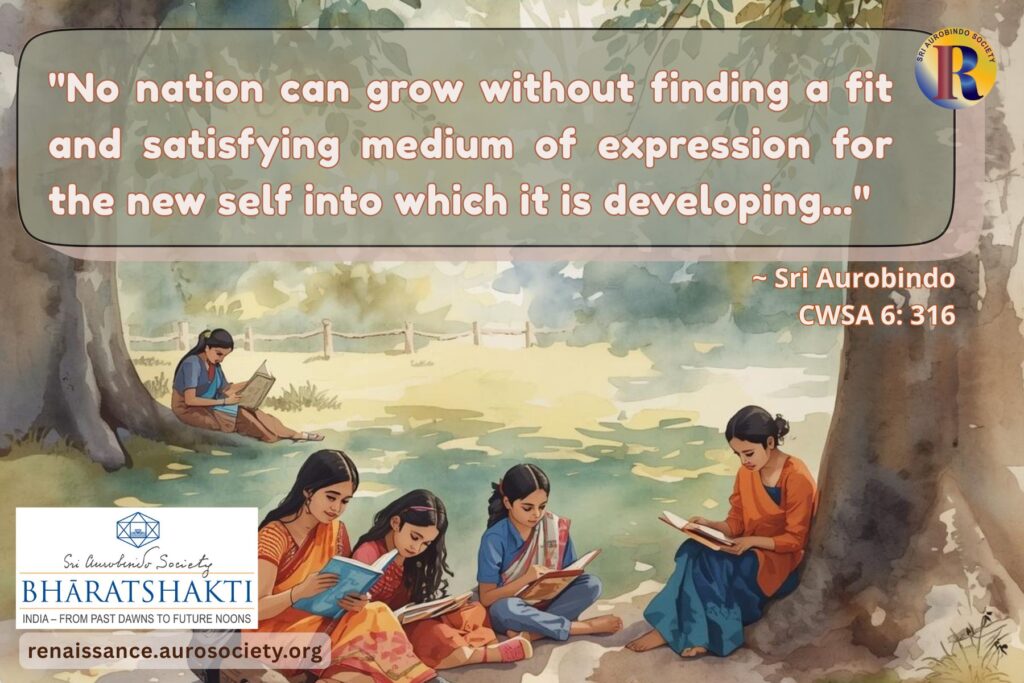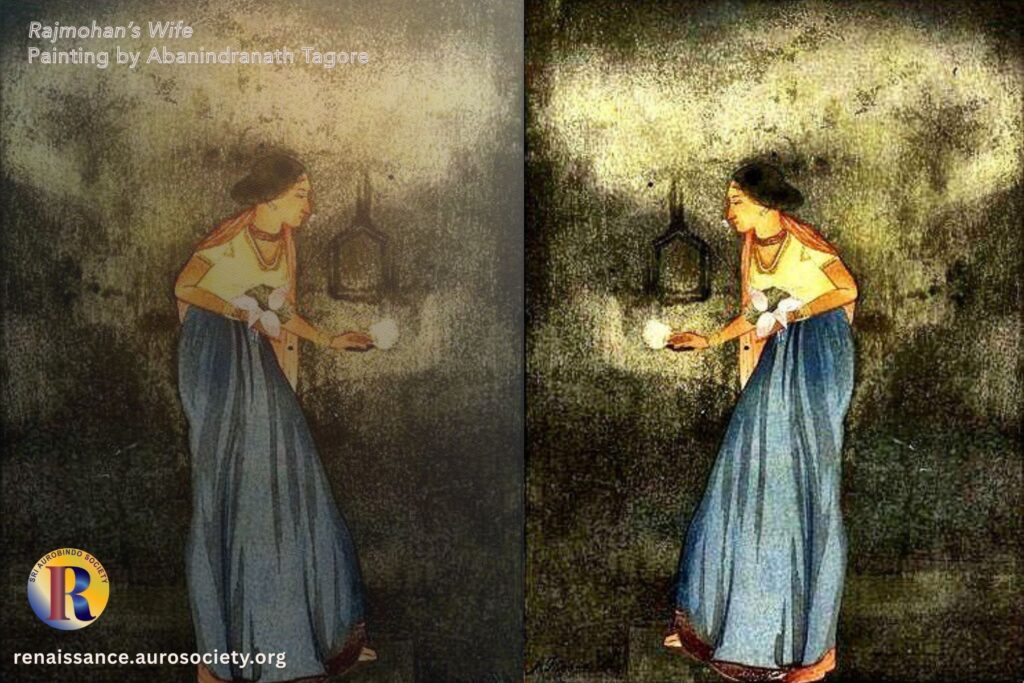Editor’s Note: The Mother explains that while most religions may have a spiritual revelation as their ultimate origin, in their nature they are mostly man-made. In the hands of men, religion ends up becoming almost like a political organisation. People soon start calling their ‘own’ religion as the supreme and true, and others as false. The Mother also describes an interaction she once had with a clergyman about religion.
We have made some minor formatting changes for this digital presentation.
🌸🌸🌸
Religion is not divine but human in its actual nature
Religion belongs to the higher mind of humanity. It is the effort of man’s higher mind to approach, as far as lies in its power, something beyond it, something to which humanity gives the name God or Spirit or Truth or Faith or Knowledge or the Infinite, some kind of Absolute, which the human mind cannot reach and yet tries to reach.
Religion may be divine in its ultimate origin; in its actual nature it is not divine but human.
In truth we should speak rather of religions than of religion; for the religions made by man are many. These different religions, even when they had not the same origin, have most of them been made in the same way. We know how the Christian religion came into existence. It was certainly not Jesus who made what is known as Christianity, but some learned and very clever men put their heads together and built it up into the thing we see.
There was nothing divine in the way in which it was formed, and there is nothing divine either in the way in which it functions. And yet the excuse or occasion for the formation was undoubtedly some revelation from what one could call a Divine Being, a Being who came from elsewhere bringing down with him from a higher plane a certain Knowledge and Truth for the earth.
He came and suffered for his Truth; but very few understood what he said, few cared to find and hold to the Truth for which he suffered.
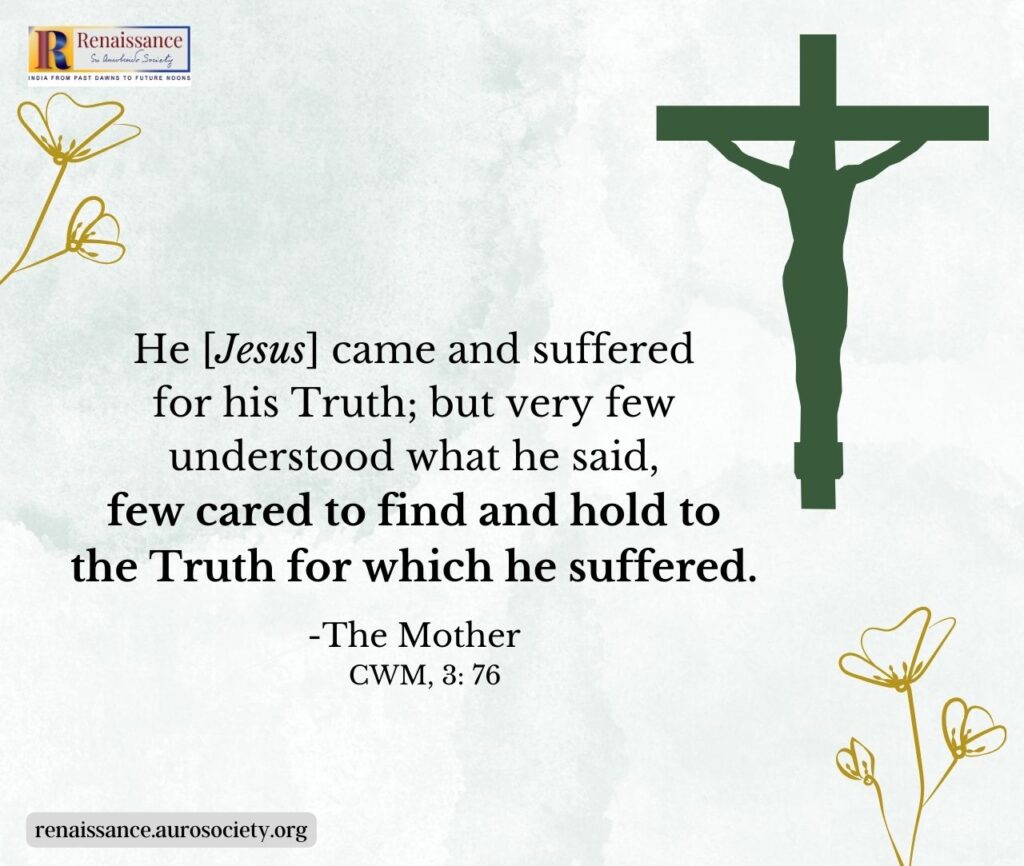
Buddha retired from the world, sat down in meditation and discovered a way out of earthly suffering and misery, out of all this illness and death and desire and sin and hunger. He saw a Truth which he endeavoured to express and communicate to the disciples and followers who gathered around him.
But even before he was dead, his teaching had already begun to be twisted and distorted.
It was only after his disappearance that Buddhism as a full-fledged religion reared its head founded upon what the Buddha is supposed to have said and on the supposed significance of these reported sayings.
But soon too, because the disciples and the disciples’ disciples could not agree on what the Master had said or what he meant by his utterances, there grew up a host of sects and sub-sects in the body of the parent religion—a Southern Path, a Northern Path, a Far Eastern Path, each of them claiming to be the only, the original, the undefiled doctrine of the Buddha.
The same fate overtook the teaching of the Christ; that too came to be made in the same way into a set and organised religion.
It is often said that, if Jesus came back, he would not be able to recognise what he taught in the forms that have been imposed on it, and if Buddha were to come back and see what has been made of his teaching, he would immediately run back discouraged to Nirvana!
All religions have each the same story to tell.
The occasion for its birth is the coming of a great Teacher of the world. He comes and reveals and is the incarnation of a Divine Truth. But men seize upon it, trade upon it, make an almost political organisation out of it. The religion is equipped by them with a government and policy and laws, with its creeds and dogmas, its rules and regulations, its rites and ceremonies, all binding upon its adherents, all absolute and inviolable.
The first and principal article of these established and formal religions runs always, “Mine is the supreme, the only truth, all others are in falsehood or inferior.”
For without this fundamental dogma, established credal religions could not have existed. If you do not believe and proclaim that you alone possess the one or the highest truth, you will not be able to impress people and make them flock to you.

This attitude is natural to the religious mind; but it is just that which makes religion stand in the way of the spiritual life.
The articles and dogmas of a religion are mind-made things and, if you cling to them and shut yourself up in a code of life made out for you, you do not know and cannot know the truth of the Spirit that lies beyond all codes and dogmas, wide and large and free.
When you stop at a religious creed and tie yourself in it, taking it for the only truth in the world, you stop the advance and widening of your inner soul.
– The Mother (CWM, Vol. 3, p. 76-78)
Read:
Hell and Heaven Created by Religions
Religion – a social duty and social custom
People follow religion by social habit, in order not to get into the bad books of others. For instance, in a village it is difficult not to go to religious ceremonies, for all your neighbours will point at you. But that has absolutely nothing to do with spiritual life, nothing at all.
(Silence)
The first time I came to India I came on a Japanese boat. And on this Japanese boat there were two clergymen, that is, Protestant priests, of different sects. I don’t remember exactly which sects, but they were both English; I think one was an Anglican and the other a Presbyterian.
Now, Sunday came. There had to be a religious ceremony on the boat, or else we would have looked like heathens, like the Japanese!
There had to be a ceremony, but who should perform it? Should it be the Anglican or should it be the Presbyterian? They just missed quarrelling. Finally, one of them withdrew with dignity―I don’t remember now which one, I think it was the Anglican―and the Presbyterian performed his ceremony.
It took place in the lounge of the ship. We had to go down a few steps to this lounge. And that day, all the men had put on their jacket―it was hot, I think we were in the Red Sea―they put on their jackets, stiff collars, leather shoes; neckties well set, hats on their heads, and they went with a book under their arm, almost in a procession from the deck to the lounge. The ladies wore their hats, some carried even a parasol, and they too had their book under the arm, a prayer-book.
And so they all crowded down into the lounge, and the Presbyterian made a speech, that is to say, preached his sermon, and everybody listened very religiously. And then, when it was over, they all came up again with the satisfied air of someone who has done his duty.
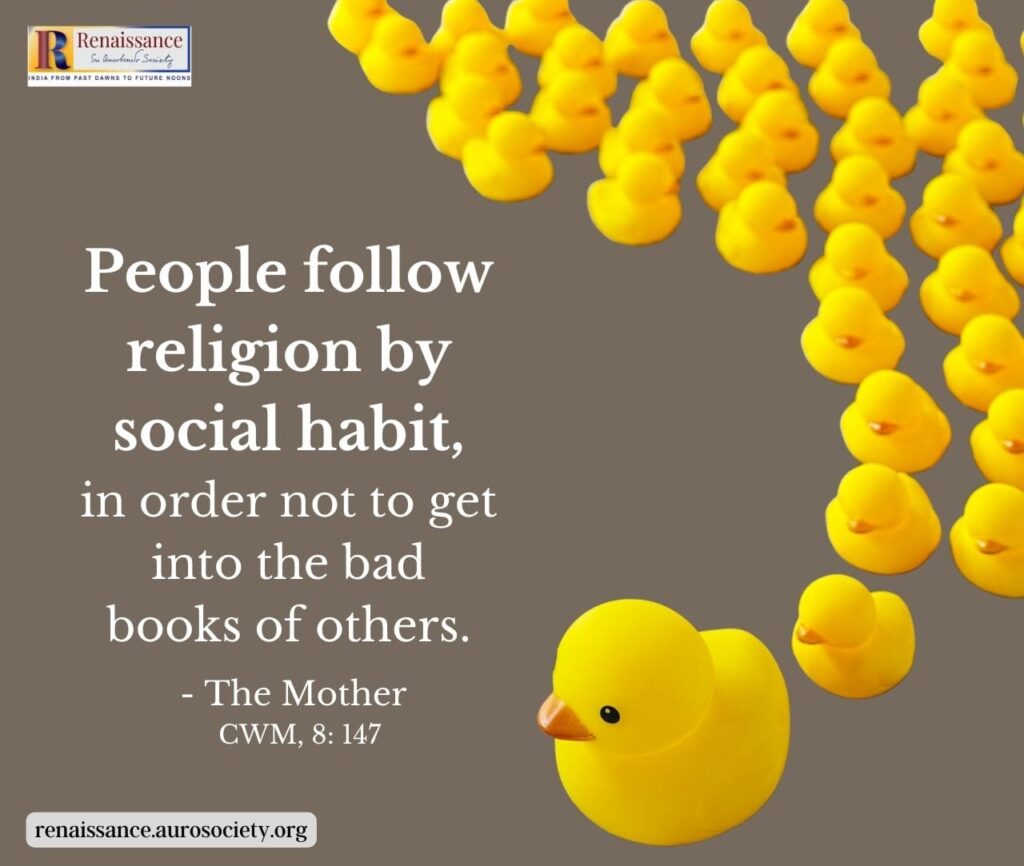
And, of course, five minutes later they were in the bar drinking and playing cards, and their religious ceremony was forgotten. They had done their duty, it was over, there was nothing more to be said about it.
And the clergyman came and asked me, more or less politely, why I had not attended. I told him, “Sir, I am sorry, but I don’t believe in religion.”
Clergyman: “Oh! oh! you are a materialist?”
The Mother: “No, not at all.”
Clergyman: “Ah! then why?”
The Mother: “Oh!” I said, “if I were to tell you, you would be quite displeased, perhaps it is better for me not to say anything.”
But he insisted so much that at last I said, “Just try to see, I don’t feel that you are sincere, neither you nor your flock. You all went there to fulfil a social duty and a social custom, but not at all because you really wanted to enter into communion with God.”
Clergyman: “Enter into communion with God! But we can’t do that! All that we can do is to say some good words, but we have no capacity to enter into communion with God.”
Then I said, “But it was just because of that I didn’t go, for it doesn’t interest me.”
After that he asked me many questions and admitted to me that he was going to China to convert the “heathens”.
At that I became serious and told him,
“Listen, even before your religion was born―not even two thousand years ago―the Chinese had a very high philosophy and knew a path leading them to the Divine; and when they think of Westerners, they think of them as barbarians. And so you are going there to convert those who know more about it than you? What are you going to teach them? To be insincere, to perform hollow ceremonies instead of following a profound philosophy and a detachment from life which lead them to a more spiritual consciousness?… I don’t think it’s a very good thing you are going to do.”
Then he felt so suffocated, the poor man; he said to me, “Eh, I fear I can’t be convinced by your words!”
“Oh!” I said, “I am not trying to convince you, I only described the situation to you, and how I don’t quite see why barbarians should want to go and teach civilised people what they have known long before you. That’s all.”
And there, that was the end of it.
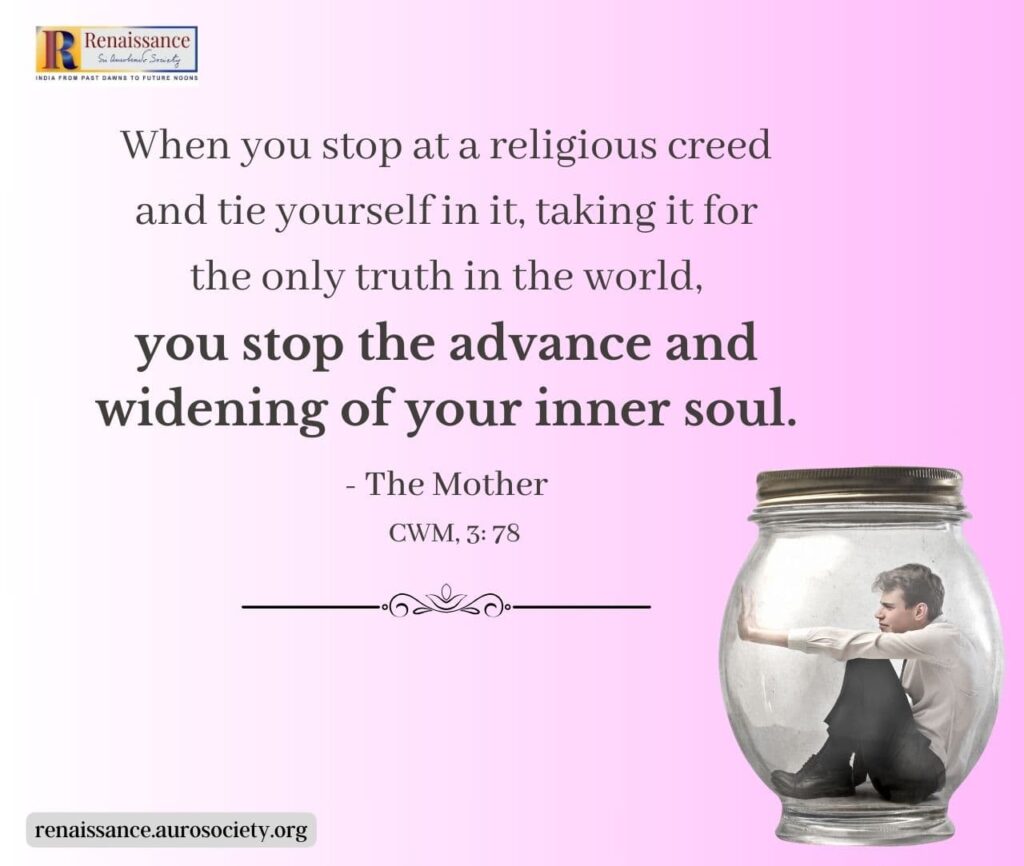
🌸🌸🌸
Also Read:
Sri Aurobindo on Religion as the Law of Life
~ Design: Raamkumar

